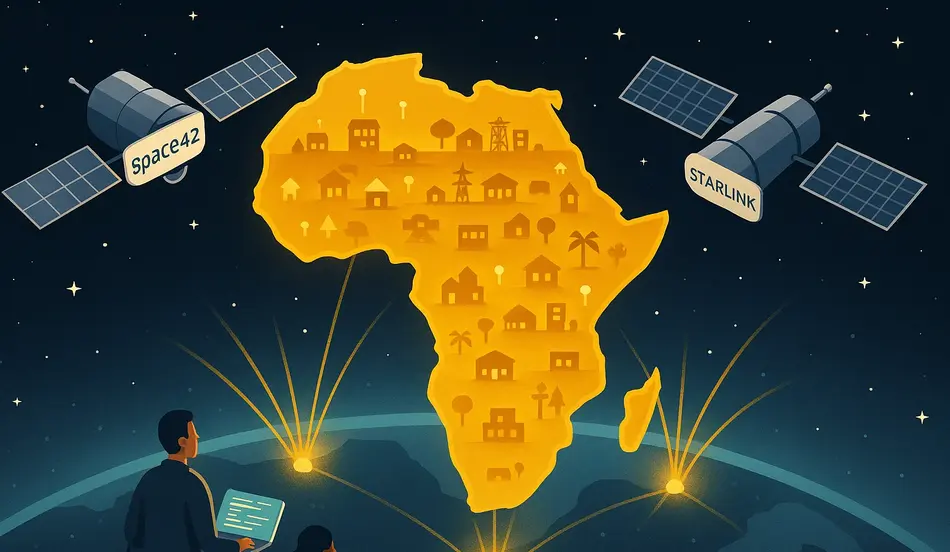Africa is becoming the next frontier for satellite internet and space services. With 54 countries, each with its own regulations and priorities, companies face enormous challenges in bringing advanced connectivity to the continent. At the center of this shift is Space42, a fast-growing firm that says it offers something different from big global players such as Starlink, OneWeb, and Amazon’s Project Kuiper.
But the debate goes far beyond technology. Governments, regulators, and the African Union are asking difficult questions: Who should control the data? How will national laws apply across borders? And most importantly, how will ordinary people, businesses, and communities benefit from this new wave of space-driven services?
Table of Contents
The Regulatory Puzzle
One of the biggest challenges is regulation. Each African nation has its own licensing rules, often designed decades ago for radio towers and broadcast television rather than thousands of satellites orbiting in space.
Hasan, a senior executive at Space42, explained that the company has been working on this issue for years:
“This has not been done in the short term. We have held ongoing discussions with the African Union, national space agencies, and development bodies. The African Union Development Agency, especially its Environmental Sustainability Directorate, has played a key role in helping us understand how these programs should benefit each country.”
The challenge is enormous. To operate legally, companies must win approval from dozens of regulators. Some require direct negotiations with ministries, while others rely on regional blocs. Building consensus across the continent is slow, but Space42 believes it is possible.
Building Partnerships That Last
Rather than simply delivering internet connections, Space42 has emphasized local partnerships and capacity building. The company wants to establish local centers of excellence in African nations that would act as hubs for training, data use, and communication between Space42 and governments.
“These centers will not only help countries use the data effectively, but also ensure long-term sustainability,” Hasan said. “They will be the bridge between us and the local stakeholders.”
This approach, Space42 argues, is what sets it apart. Instead of being a foreign provider that simply beams internet from space, the company wants to embed itself into national development strategies — from agriculture to urban planning.
Strengthen Partnerships With Local Talent
Post your job on WhatJobs and connect with professionals in Africa and beyond—building sustainable teams that align with national development strategies in tech, data, and infrastructure.
Post a Job Now →The Growing Competition
Africa is not an empty market. Starlink, run by Elon Musk’s SpaceX, has already launched services in more than a dozen African countries. Its goal is to deliver low-cost internet access using a constellation of satellites. OneWeb, partly backed by the UK government, is also expanding its footprint, and Amazon’s Project Kuiper is preparing to enter the field.
So how can Space42 compete with such powerful rivals?
“Competition is always healthy,” Hasan noted. “We benchmark ourselves against the global market, but we focus on what makes us unique.”
That uniqueness lies in the combination of three services:
- Satellite communications (providing connectivity)
- Earth observation (using satellites to map and monitor the planet)
- Geospatial data processing (turning raw satellite images into actionable insights)
By merging these, Space42 says it can offer both internet access and critical data. For example, governments can use satellite imagery to monitor deforestation, track urban growth, or manage natural disasters — all while expanding digital connectivity to rural communities.
Why Local Benefits Matter
In Africa, connectivity is not just about speed. It is about development. Millions of people still lack reliable internet, and governments often rely on outdated maps or limited data to make policy decisions.
Hasan explained that Space42’s mission is to design services that “benefit nations, partners, and clients globally.” The company is focusing on areas such as:
- Sustainability: Using satellites to monitor climate change, drought, and farming conditions.
- Connectivity: Bringing broadband to rural areas far from fiber networks.
- Geospatial intelligence: Helping governments use data for planning and security.
By aligning its services with national goals, Space42 hopes to avoid being seen as just another foreign tech provider. Instead, it wants to be a partner in Africa’s development journey.
The Trust Question
For African governments, trust is essential. Many nations worry about becoming dependent on foreign providers, particularly when sensitive data such as satellite images are involved.
Hasan acknowledged these concerns and said transparency is part of Space42’s strategy:
“We are conscious about what we are building and expanding. Our top priority is how our services benefit nations. Quality, capability, and use cases will always be benchmarked against any other competition.”
By involving the African Union and national agencies, Space42 hopes to build confidence and avoid the criticism that has followed other providers accused of ignoring local needs.
Looking Ahead: Africa’s Role in the Space Economy
The African Union estimates that the continent’s space and satellite economy could reach $20 billion by 2025. With more governments investing in space programs and private companies entering the market, Africa could become one of the fastest-growing regions for satellite-based services.
But regulation, cost, and politics remain challenges. Some countries welcome competition, while others are cautious about foreign influence. The future may depend on whether firms like Space42 can deliver not only reliable connectivity but also genuine development value.
For now, Space42 is betting on a holistic approach: offering communications, observation, and data together, while building long-term partnerships on the ground.
FAQ: Africa’s Satellite Internet Race
1. What are LEO satellites and why are they important for Africa?
LEO stands for Low Earth Orbit. These satellites orbit closer to Earth than traditional ones, meaning they can deliver faster, cheaper internet to remote areas. For Africa, where fiber infrastructure is limited, LEO satellites can bridge the digital divide.
2. Why is regulation such a challenge?
Africa has 54 countries, each with its own rules for licensing. Unlike the EU, there is no single regulatory system. Companies must negotiate individually with nations or through regional blocs, making expansion slow and complex.
3. How is Space42 different from Starlink or OneWeb?
While Starlink and OneWeb focus mainly on providing internet access, Space42 combines internet services with Earth observation and geospatial data. This allows governments to use satellite data for planning, agriculture, and security alongside connectivity.
4. What benefits could African nations see from these services?
Potential benefits include:
Improved internet access in rural areas
Better disaster management with real-time maps
Smarter farming decisions using climate data
Stronger urban planning with updated satellite imagery




